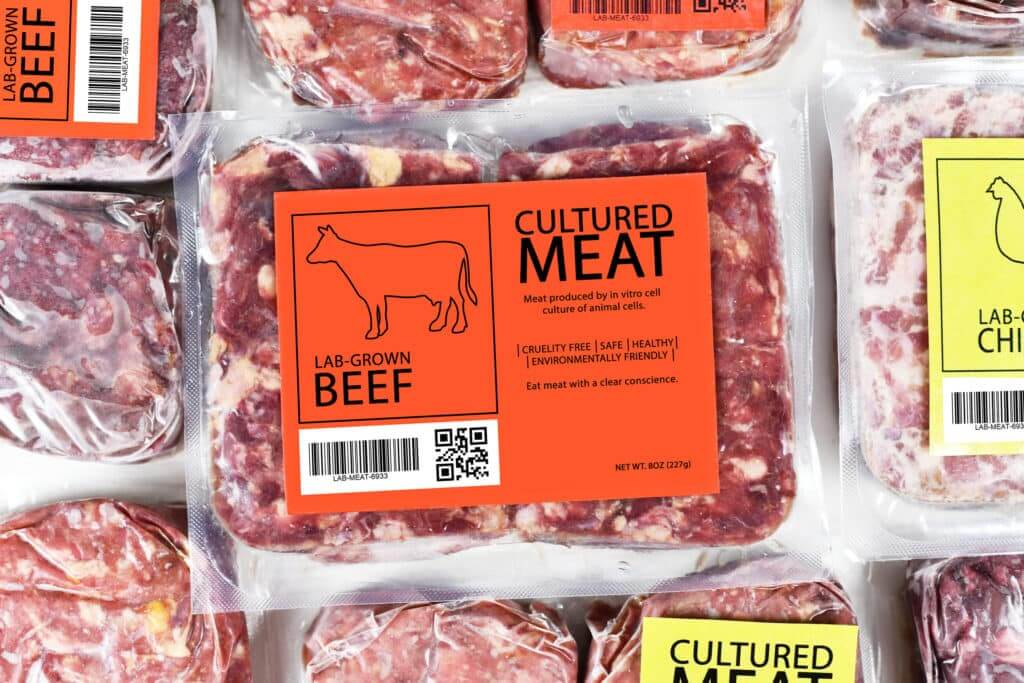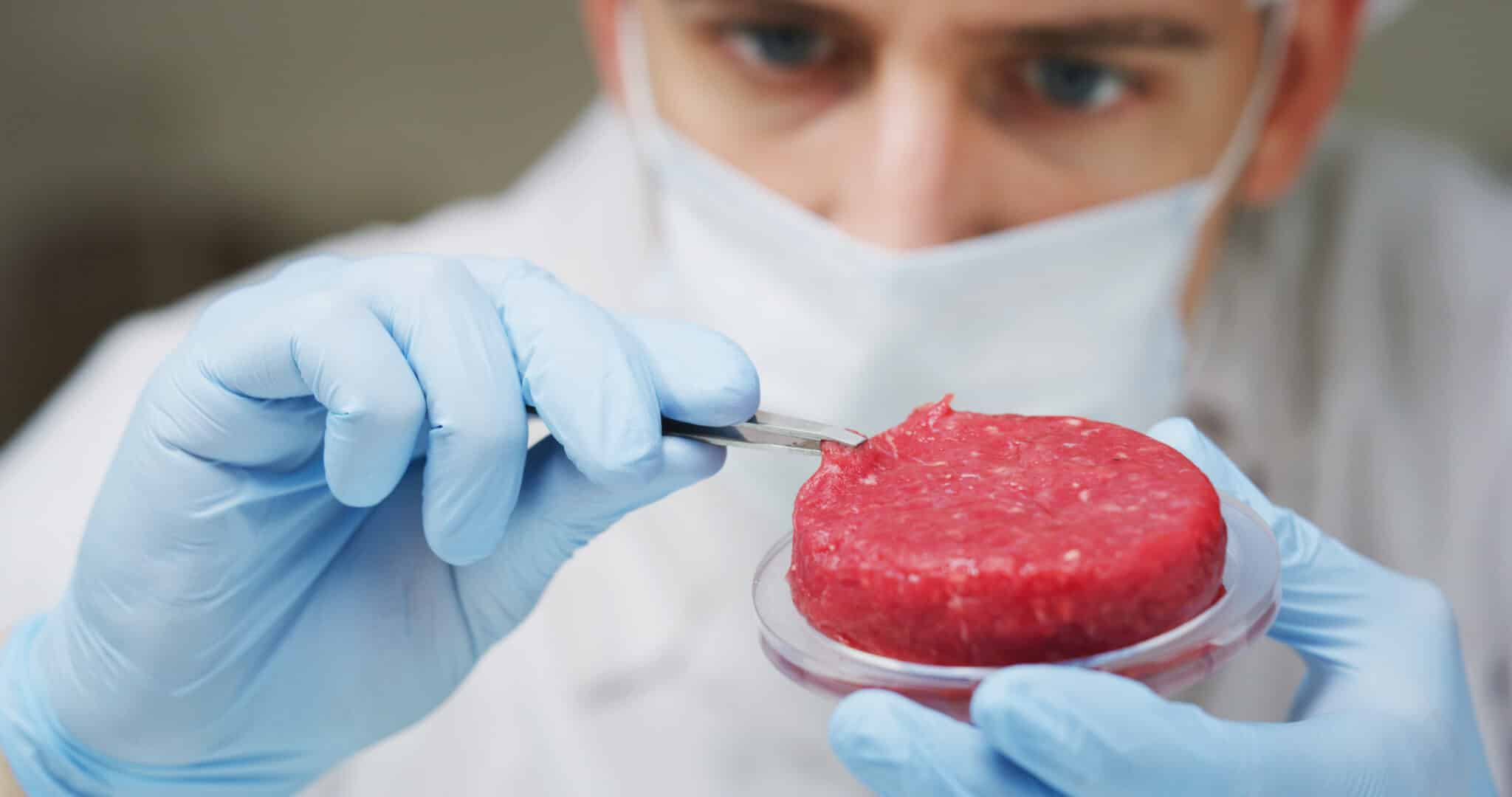Veganuary is over for another year. Thank goodness, say livestock farmers, who for 31 days at the turn of each year are called out as carbon criminals.
But there is nuance in this debate and those ploughing the middle road have suggested we eat ‘less but better meat’. It’s a snappy message but brings plenty more questions, not least what do you mean by ‘better’?
But what if there were a silver bullet here – one that offers meat without the ethical and environmental baggage?
That is the promise of cultured meat. Produced in a laboratory using animal cells, it is just one of the meat ‘alternatives’ vying for our attention. This isn’t ‘meat’ made from plants, or the relatively new idea of making animal protein from fermentation; this is meat as we know it but supposedly ‘guilt-free’. The concept is tantalising.
“For the first time, meat from real animals that hasn’t required a single animal to be killed or a single tree to be cut down can be sold,” said Josh Tetrick, chief executive at Eat Just, the US start-up that created nuggets from cultivated chicken and became the first lab-grown meat approved for human consumption.
Diners in Singapore have been enjoying them for the past two years. They aren’t cheap but they’re a lot cheaper than that first, and still most famous, burger grown from animal cells that was unveiled in 2013 (£200,000).
Indeed, cultured meat has been a long time coming but things are really starting to happen. The US government has just cleared the way for Americans to be able to eat lab-grown meat in what some have called “the day the food system really started changing”. The Netherlands, meanwhile, has joined France and Germany in allowing cultured meat to be used in ‘tastings’.

Here in the UK, the government seems supportive of a technology that boasts of far lower environmental impacts than traditional meat.
Cultured meat cannot yet be sold in the UK though, primarily because no company has attempted to file an application, which is likely to be time-consuming, expensive and open to legal scrutiny.
We apparently have the richest landscape of cellular agriculture companies in Europe, according to NGO ProVeg, with 12 companies that are working on cultured meat, cultured fat, cell-line developments, or bioreactor systems.
One of those is Roslin Technologies based near Edinburgh, Scotland. Here, scientists are working with ‘pluripotent stem cells’ that can be turned into any animal cell type, including muscle and fat cells, and which can self-replicate indefinitely without deterioration.
These traits make them ideal for large-scale and more efficient production of cultivated meat – the few millilitres (and couple of billion cells) in each vial delivered to companies in Europe, the US, Asia and Middle East, can potentially produce massive amounts of meat in the future. Potentially.
Cultured meat does have potential but it’s still early stages, says Illtud Dunsford, co-founder at Cellular Agriculture, which is developing bioreactors in which the meat ‘grows’. It’ll be 10 to 15 years before maturity and some form of price parity with traditional meat, he reckons.
Far from just being worried about the competition, they’re talking about how cultured meat could concentrate corporate power and distance people even further from where their food comes from. Tom MacMillan, Royal Agricultural College
But what impact will such scale have? Speak to those invested in this tech and all the talk is of huge savings on emissions and land use. Firm facts can be hard to find, though, as a recent Oxford study found that “replacing cattle with cultured meat may not be a simple replacement of high-impact with low-impact”. Much rests on whether all those bioreactors are powered with green energy.
The public also has to be convinced this is a good (and safe) idea. Only 30 per cent of UK consumers feel cultured meat is safe to eat, according to research by the Food Standards Agency (FSA). For insects it’s 50 per cent, while for plant-based proteins it’s 77 per cent. Still, more were more willing to try cultivated meat than crickets and other edible insects (34 per cent versus 26 per cent).

How do farmers feel about cultured meat? Professor Tom MacMillan from the Royal Agricultural College in Cirencester is part of a project to see how they will be affected if cultured meat takes off.
“Far from just being worried about the competition, they’re talking about how cultured meat could concentrate corporate power and distance people even further from where their food comes from,” he explains.
The options available are not simply ‘intensively produced animal products’ versus ‘lab-manufactured proteins. Patrick Holden, dairy farmer and chief executive of the Sustainable Food Trust
MacMillan and his team are also looking at the agricultural products that could go into making cultured meat. While it is early days for that research, they’re investigating whether there are crops, or even by-products, from livestock farming that could supply the cultured meat industry.
“For almost as long as scientists have been working on cultured meat some, especially in the Netherlands, have imagined a future where it is produced at a craft scale on farm. We’ll be looking into this possibility too, though at this stage it’s hard to see how the cards aren’t stacked against it,” he adds.
Patrick Holden, dairy farmer and chief executive of the Sustainable Food Trust, says he understands that when presented with a choice between meat produced from intensive livestock systems or synthesised proteins people might well choose the latter. “The problem with this picture is that it is based upon a false dichotomy,” he explains.
“The options available are not simply ‘intensively produced animal products’ versus ‘lab-manufactured proteins’. There is another – and in my opinion, vastly preferable – option [which is] meat produced from high-welfare, regenerative systems, that allow nature to thrive.”
Cultured meat is a few years off for the UK but it will be coming to a restaurant or supermarket near you.
Competing interests will all sell their own (sustainable) story and as ever it’ll up to us, the public, to decide with our wallets. Perhaps more of us will simply opt for plants.
Meat and ‘meat’: The glossary
Lab-grown meat. Meat that is ‘grown’ from animal cells in a lab, without rearing or killing an animal – not available for sale in the UK.
Cultured meat. See above.
Fermentation. A new technology that is growing protein to “rival animal products” through fermentation.
Meat-less meat. Gaining huge traction in the UK as a processed meat alternative, made with plant proteins like pea, soy, mushroom or wheat. Most well-known are brands like Quorn, as well as Beyond Meat and newer brands like La Vie, with its pork-less bacon.
Meat. Actual animals, reared on farms (or in factories). Look out for labels like organic and free range for higher welfare. Visit your local butcher to find out what farms are in your area and how they rear animals.
Plants. Obviously not meat but can provide some protein as part of a balanced diet. Read our guide to veggie recipes with high plant protein.









Thank you so much for this article. I look forward to the day when no animal will have to die to feed humans, especially in countries where there are so many alternatives.
I was really surprised and disappointed how few people polled in favour of lab-grown meat. What’s the concern, exactly? People have no reservations about eating processed food generally. (Does synthesised meat count as processed?)
On the ethical front, I dream of the day our domesticated cattle turn back into wild aurochs. Surely the less we enslave others, the freer we all are?
In theory, lab-grown meat ticks many boxes but there is a huge amount of education needed first. How exactly does it work? How do the nutrient values compare? What is the texture (after all, meat is a muscle and the lab-grown kind won’t have ever been exercised)? Is the fat synthesised in the same way? Is it large corporations who own the process?
I’m not saying any of this as protectionism for the current meat system, which is mostly abhorrent on so many levels. At its core, I guess I struggle with human’s inability to reduce the amount of meat we feel the need to eat. Again, another level of education is needed so that we learn to spread our protein intake across a broader spectrum of protein sources.
I agree with Patrick Holden regarding regenerative production – and am increasingly concerned that the further we go from what is natural to eat the more problems we will see down the road both physical and financial. The less processed the better in my opinion. I am deeply concerned about the increasing power of the big corporations.
Whatever happened to the idea of Wholefood? Food processed as little as possible? I’ve been eating a mixed meat and vegetable diet for 80 years, and see no reason to change now to fads of any description, since this country (UK) is able to able to cope with regenerative farming if given the incentive. It has land suitable for mixed farming, and our aim should be self sufficiency in our protein source at least. Fake meat is an anachronism.. Why make up fake meat, with texture and flavour similar to the real meat? Words fail me. I sincerely hope that fake meat never beomes popular. I’m all for food being organically and carefully produced *naturally*.
Perhaps these comments won’t be popular here, but it is time for many more people to actually say how they feel.
I think we’re losing sight of the fact that lab-grown meat is real meat, it’s just not attached to the animal who has to be slaughtered.
TThe younger generation is keener to switch, or at least to try new things. The older generation less so. A lot of things we depend on now aren’t “natural.” Surgery, computers, cars, eyeglasses, contraception, even big, tasty fruit and veg (Their wild cousins are mostly small and bitter). Purists should be willing to forgo all of these.
Reply to Ani. You can’t divide older and younger people in such general terms
No, this elderly person is quite aware of what lab grown meat is, but declines to have anything to do with it. In too many situations, I feel we are being led by technology rather than using it as we would like, and when we have the need. We don’t *need* lab grown meat. (like we don’t *need* violent computer games either) A lot of things are being done, not out of need, but because we *can*.
Does anyone else remember an early 70’s movie ‘Soylent Green’ ? Beware the way we are being pushed into a dystopian future ruled by technocrats. Edible insects? Seriously? Insects are mainly chitin, which is poisonous to humans. There is an abundance of natural food out there – we just need to waste less of it.
The human gut produces chitinase, but only in small amounts because chitin isn’t currently part of our diet. It will increase as needed.
To feed 8 billion people and counting, we need as many options as possible to do so whilst bringing down emissions. Veganism is right for many people, but so is a carnivorous diet to obtain important nutrients. Lab-grown meat should be on the shelves as soon as possible to help us to our climate goals.